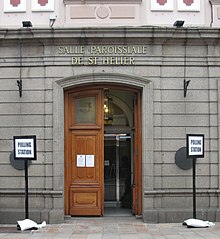Elections in Jersey
It was not uncommon for an incumbent Senator denied re-election by the Island electorate to seek a refreshed mandate in their own parish.
A number of prospective candidates for Deputy used the preceding Senatorials as a dry-run to either raise their public profile or, in the absence of a strong tie to one particular parish, to see which Deputorial constituency gave them the highest Senatorial vote.
The proposer and seconder must attend in person the Electoral Assembly ("nomination meeting") held at the Parish Hall of St Helier, presided over by the Comité des Connétables, and the proposer must read out publicly the nomination form, including the candidate's declaration of criminal convictions (or of no criminal convictions).
[6] If more candidates are nominated than there are seats available, a poll is declared, to be taken on the date set by the Royal Court.
The Royal Court appoints an autorisé for each constituency to oversee the poll (usually, but not exclusively, a Jurat or Crown Officer).
In multi-member districts, the system is that of a first past the post bloc election analogous to the Senatorials.
Procureurs du Bien Public and Centeniers are elected under the same rules as Senators, Deputies and Constables.
Those eligible to vote at a public election[10] (for Senators, Deputies, Constables, Procureurs du Bien Public and Centeniers) are those whose names are included on the electoral register for the relevant electoral district (the register is compiled by vingtaine).
The law was brought into force on 12 March 2008, with effect from 1 April 2008, allowing 16- and 17-year-old voters to register in time for the 2008 elections.
Since the 1948 constitutional reforms, Jurats are elected by electoral college rather than by Islandwide vote.
